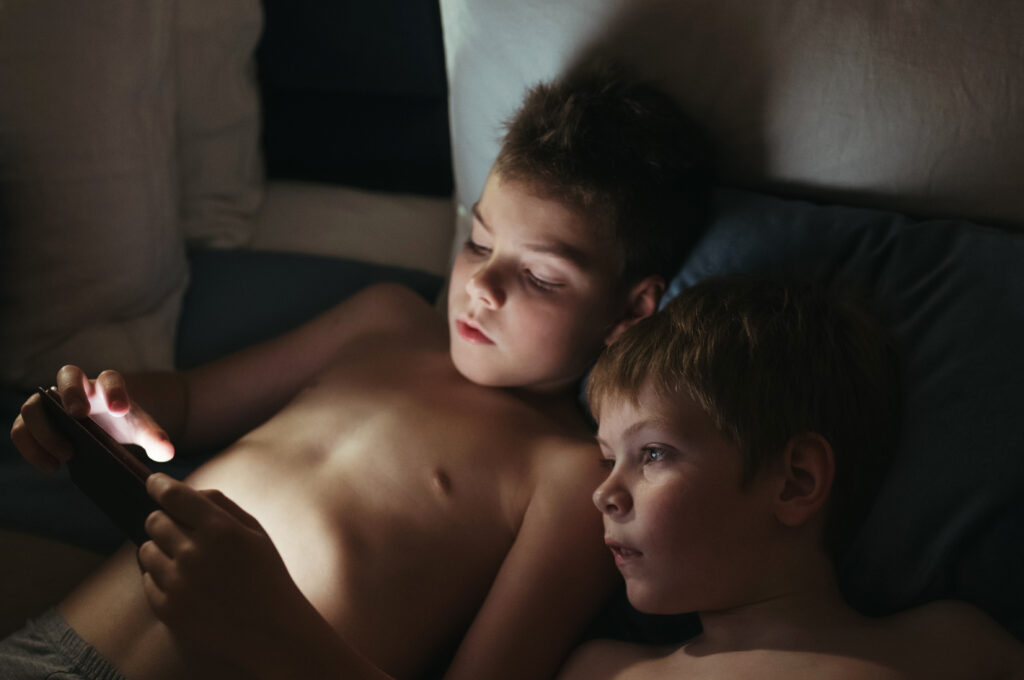We spoke to Jordan Shapiro, international speaker and author, about the challenges, realities, and opportunities of raising children in a connected world.
Jordan Shapiro is an international speaker and author whose fresh perspective combines psychology, philosophy, and economics in unexpected ways. His book, The New Childhood: Raising Kids To Thrive in a Connected World, changed the cultural conversation about parenting and screen time.
In your book “The New Childhood”, you took a deep look at the new digital landscape of childhood-why did you think that was important?
It’s so often that you’ll see these memes on social media: “when you think back to your childhood, what do you think? Are you going to remember the days when you played outside, or the days when you played a video game?” Whenever I see that, I’m like, Actually, I totally remember sitting in the theatre watching E.T. for the first time. There are so many things around screens that I do remember. And I’m not even crazy digital, like my kids. But every time I would hear these things, I would think, what are these things that people think are essential nostalgic moments of family time?
That’s what really led me to “The New Childhood” as a book. I did research and discovered that so many of the things that people think of as the essential key to perfect parts of family life were invented in the 20th century. They never existed in any form before that.
Do you believe the online world gives more opportunities for kids to explore than they currently have in the offline world?
Parenting has become very restrictive in comparison to what it was a generation ago, kids aren’t allowed to go play on the street the way they were a generation ago. I think they found the “street to play” in things like Roblox and Minecraft and Fortnight. They found a place to live in that imaginary world and I think that’s positive. Especially if you think about the potential for those who wouldn’t have had it anyway because of where they live, it has the potential to open up worlds.
It even has the potential to level out the current play gap. The access to a wider world through technology is huge. There’s a really positive thing in online gaming in the amount of global communication that’s happening with kids. My kids are playing with kids from all over the world, and they constantly talk about it. Immediately after the Capitol Riots they were on games playing with Trump supporters and hearing what their families were saying about it. I think that’s really powerful. It gets them outside of a bubble, which they’re definitely in, no matter how hard any of us try.
Many parents find it challenging to figure out the rules on technology. Do you believe parents should be giving children more freedom to roam, or should they take more control of their child’s online world?
I think kids should have the right to explore on some level, but we also need parenting that teaches them how to explore in positive ways. They need to know how to make sense of what they’re seeing and what they’re doing in ways that align with your family’s values.
Where parents are often wrong is that because the devices feel so private–because cell phones go in your back pocket or under your pillow, because the device feels so personal to you when you’re using it as a parent–there’s this sense of hands-off when it comes to kids. A sense of I’m not going to watch everything they do, especially when they become teenagers, that they deserve their privacy on their phone. This is an absurd notion. There’s no such thing as privacy on the internet. You don’t have any, and the last thing I want is for my kids to think that they have any privacy there. We do not want our kids to think it’s a safe, private space.
"The idea that phones are private is an absurd notion."
You need to learn that certain behaviours aren’t for public places, certain behaviours aren’t for school. When you were a little kid, just like me, you learned, I’m allowed to say “f*ck” all I want, as long as I’m behind the bushes and the teachers aren’t listening. You learn how to do the code-switching. And we’re at risk of giving them the total wrong sense of code-switching.

It sounds like there’s an online etiquette that needs to be part of modern-day parenting; how can parents teach this?
You teach that by going, “Let me see what you’re doing”. You have to teach that by letting them live a life where you’re noticing them, where you’re following them, where you’re watching them. My children had a phone around the age of six. Six-year-olds don’t really have a sense of privacy, they don’t want to hide anything from their parents. They want their parents to be proud of everything they do. I think waiting to give a device that powerful to a child until they’re 13–when their hormones are raging, full of anger, rebelliousness, and recklessness–I think it’s a big mistake.
When my kids were six, and I asked them to do something, they’d come back proud to show me that they had done exactly what I had asked. Now, when I ask them to do something, they go, “No, and here’s my argument for why not”. You can’t teach sex in one conversation over dinner about the birds and the bees. That’s an ongoing conversation about consent, about understanding reproduction and understanding, respect and dignity and so on, and so many things that needs to be reinforced for years before it’s ever a possibility. And so, I think it’s similar when it comes to technology
"You can’t teach sex in one conversation... that’s an ongoing conversation that needs to be reinforced for years. I think it’s similar when it comes to technology."
Do you see the digital world as a place where children can experiment and develop?
If you think about how much of your life is lived through digital technology, then you need to understand that kids need the access to experiment and to learn, and to be creative with it in a low-stakes environment. That’s what childhood is, childhood is the low-stakes time to try out different things. We need that chance for them to experiment and learn, and to become accustomed to it, and for it to become somewhat second nature. And for that, they need the play time. For that, they need the opportunity to play with digital toys, digital tools, in digital spaces. Don’t let it replace anything else.
You should absolutely be worried if your kids are not on a playground, if your kids are not going outside, if your kids are not interested in anything but the things on the screen. But you should also be worried if they’re only interested in books and nothing else. Screen time is not optional anymore; it’s part of a well balanced life.
Do you believe growing up with technology from a young age can give you a better chance at success in life?
You can’t participate in an adult economy without technology. Therefore, you want to get your kids to do that well. A good example might be how it’s hard to communicate tone in a text message. It’s easy to misunderstand people in text messages. I’m pretty sure the next generation will not have that problem. When you get to grow up while doing that so much, that doesn’t happen. It’s a speculation but I would make that argument based on [the fact that], while I might misunderstand your emails or your text messages, I don’t misunderstand my wife’s emails and text messages because there’s so many of them, we’ve learned how to interpret.
"Screen time is not optional anymore; it’s part of a well balanced life."
Those are skills that you learn through practice. Starting kids young is going to make them better at email, at text, at Slack than most adults are. More effectively and in a way that doesn’t interfere or distract them in a way that it can. There’s a huge difference between those who can write a good email and those who can’t. Those who say too much and those who don’t, and those who understand how people use it. This is a skill that’s probably best learned through practice. There’s no right way to do it, it’s a social skill, it’s the same as a playground interaction. It’s about me being able to read the tone in your email and knowing what to send back. And kids need practice with that. We’ll have much smarter, more fulfilled adults, if they start practicing that now.
Download the full report, The Parenting Upgrade, here.


No Comments.